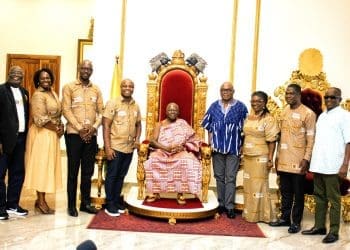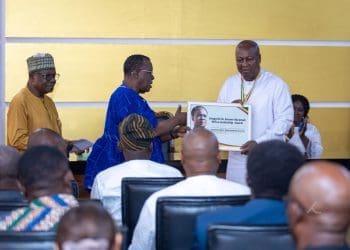At a solemn yet celebratory gathering steeped in history and vision, Mfantsipim School has launched a landmark publication titled Mfantsipim, A Headmaster Remembers, authored by the indomitable F. L. Bartels — the headmaster whose stewardship defined a transformative epoch in the life of the school and the educational conscience of Ghana.
Delivering the keynote review at the book launch was Prof. Ato Sekyi-Otu, the renowned Ghanaian political philosopher and a proud alumnus of Mfantsipim (1955–1961), who rose to serve as Headboy in his final year.
In a riveting intellectual address, Prof. Sekyi-Otu unveiled the profound philosophical, political, and moral dimensions of Bartels’ work, describing it as “a visionary reconstruction” of not only a school’s legacy but also a national idea.
Unpacking the name: From ethnicity to national soul
Very early in the book, Bartels addresses a historical misconception that the name “Mfantsipim” signals a school founded solely for Fantis.

Prof. Sekyi-Otu drew attention to this deliberate clarification by Bartels, who firmly states: “Nothing could have been farther from the thoughts of the founders.” Rather, “Mfantsipim” — contrary to ethnocentric readings — was intended to mean “the soul of the people.”
The founding principle, as Bartels envisioned, was radical in its egalitarianism.
Admission and opportunity were not to be based on tribal loyalty or ethnic entitlement, but on merit.
“Merit meant something authentically egalitarian,” Prof. Sekyi-Otu reflected, “truly committed to national necessities.”
This commitment to the common good extended beyond school gates — it was, and remains, a blueprint for nation-building without tribalism, nepotism, or any form of particularism.

Education as nation-building: Beyond the classroom
Bartels’ legacy, Prof. Sekyi-Otu argued, lies in his framing of Mfantsipim not just as an elite institution but as a crucible for national consciousness.
The school, he said, was conceived to offer an education that nourished civic virtue and instilled public purpose — education for “the social capital of the nation.”
“Neither the school nor the nation… was up for capture by an ethnic group,” Prof. Sekyi-Otu declared, invoking Bartels’ refusal to allow educational institutions to become instruments of sectional dominance.
This, according to Bartels, was the moral vision entrusted to Mfantsipim by its Methodist founders — a vision of excellence in service of a pluralistic, unified Ghana.

The ‘New Being’: Mfantsipim’s existential challenge
In one of the most arresting parts of his review, Sekyi-Otu focused on Bartels’ description of the Mfantsipim student — and by extension, the African of the modern world — as “a new being” among earthlings.
Here, the text approaches a metaphysical height, positing that Africans, dispossessed of cultural continuity by history and colonialism, are compelled to build anew, not by replicating ancestral models, but by constructing an entirely original civilisation.
“There is no place here,” Bartels writes, “for lazy traditionalism or unthinking imitation.”
The school motto Dwen Hwe Kan — Think and Look Ahead — captures this urgent task of futuristic agency.
The challenge is to forge paths not previously walked, with self-awareness and purpose, building a civilisation responsive to its time.

Faith and reason: A balanced vision
Prof. Sekyi-Otu also highlighted Bartels’ nuanced take on the role of religion. While grounded in Christian belief, A Headmaster Remembers resists what Bartels terms “religious platitudes.”
Instead, he calls for a Christianity that sharpens reason, energises purpose, and reinforces self-esteem, not one that excuses inertia or fatalism.
This perspective, Prof. Sekyi-Otu noted, speaks directly to the current state of public discourse in Ghana, where faith has at times overwhelmed reason in civic life.
“Bartels was a man of faith,” he said, “but a man of faith who believed that faith disjoined from the exercise of our agency is inconsequential.”
Episodes of near-death and resurrection
Throughout the book, Bartels chronicles pivotal events in Mfantsipim’s history with dramatic narrative flair.
Prof. Sekyi-Otu was especially moved by the depiction of the school’s early struggles, particularly the near-collapse after its enthusiastic 1905 opening — a nadir only reversed by the arrival of Rev. W.T. Balmer in 1907, and the legendary steadfastness of “The Faithful Eight.”

Moments such as the introduction of Sixth Form and the inclusion of Wesley Girls’ students were noted as life-altering, while Bartels’ critical engagement with debates on curriculum — specifically the false binary between practical skills and liberal arts — offered trenchant insights into Ghana’s enduring educational dilemmas.
STEM vs humanities: The wisdom of balance
As Ghana today navigates an age of Science, Technology, Engineering, and Mathematics (STEM) worship, Prof. Sekyi-Otu commended Bartels for cautioning against intellectual apartheid. Though a champion of science, Bartels equally prized the humanities.
“If I hear him correctly,” Prof. Sekyi-Otu said, “he would tell us: without STEM, we are going nowhere; with STEM alone, we have no clue where we are going, or why.”

This, Sekyi-Otu noted, is perhaps one of the most urgent lessons the book offers modern Ghana.
The call to Community: A challenge for our time
In concluding his review, Prof. Sekyi-Otu distilled Bartels’ vision into two interconnected imperatives: the call to community — the national community, not an ethnic enclave — and the embrace of our unique place in history as a “new being.”
“It is only as we act in concert, dream together, subordinate self and ethnic identity to the national good, that we will find the strength to fulfil the immense tasks demanded of us,” he affirmed.
Anything less, he warned, risks surrendering to “comforting ideologies of restoration” and “religious platitudes” that promise salvation without sacrifice.
A book for the nation
“Mfantsipim, A Headmaster Remembers” is far more than an institutional memoir.
It is a deeply intellectual, moral, and nationalistic document that calls us to rediscover the meaning of merit, public purpose, and educational integrity.

Prof. Sekyi-Otu so eloquently demonstrated, Bartels’ book is a timely compass for a nation adrift in partisanship, tribalism, and rhetorical piety.
“In remembering Mfantsipim, we are called to remember Ghana — not as a collection of tribes or faiths, but as a purposeful project demanding sacrifice, reason, and common striving.
In celebrating the book, we honour not just a headmaster, but a headlight — whose luminous reflections still light the path for those willing to “think and look ahead.”














